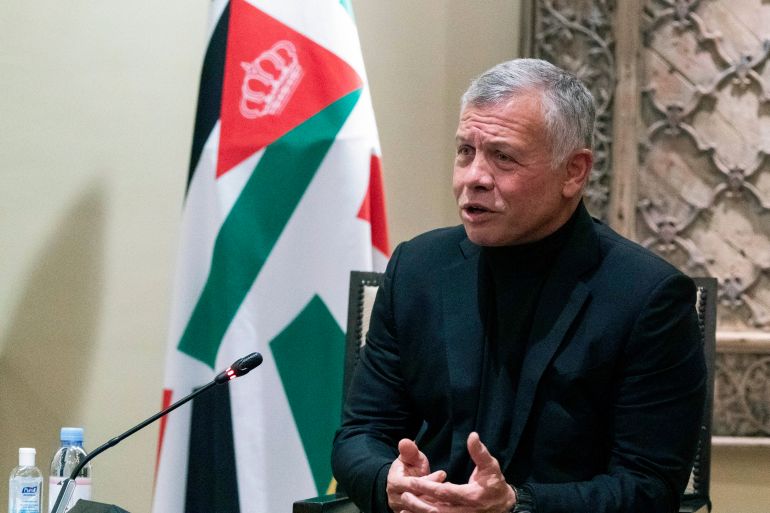Jordan’s king receives first call from Syria’s al-Assad in decade
Syria says the two leaders discussed bilateral relations, ‘reinforcing cooperation in the interests of the two countries and people’.

Jordan’s King Abdullah II received a call on Sunday from Syrian President Bashar al-Assad, the palace said, the first conversation between the two leaders after a decade of strain over Syria’s war.
The call comes days after Amman opened its border with Syria, amid efforts aimed at boosting cooperation between the two countries, which are facing challenging economic conditions.
Keep reading
list of 3 itemsCopper mine threatens Jordan’s largest nature reserve
Jordan’s Crown Prince Hussein contracts COVID
The Jordanian royal court said the leaders discussed relations between the “brotherly countries and ways to enhance cooperation between them”.
Abdullah affirmed his country’s support for “efforts to preserve Syria’s sovereignty, stability, territorial integrity and people”.
Syria’s state news agency SANA said al-Assad called Abdullah to discuss bilateral relations and “reinforcing cooperation in the interests of the two countries and people”.
The call is part of a new thaw in relations between the two neighbours after the Syrian war, which the United Nations has said killed at least 350,209 people.
Warming up of ties
Syria’s defence minister visited Jordan late last month. A 10-year-old deal to transport Egyptian natural gas through Jordan, Syria and Lebanon was also revived in September.
Syria was suspended from the 22-member Arab League bloc in November 2011, months after the conflict was sparked by the brutal repression of anti-government protests.
Several regional powers, betting on the demise of al-Assad’s regime, suspended diplomatic ties with Damascus. But Jordan maintained relations with Syria, albeit limited.
Amman hosted Western-backed opposition groups and took in hundreds of thousands of refugees.
Arab and Western countries generally blamed al-Assad for the deadly crackdown on the Arab Spring protests, and supported the opposition in the early days of the conflict, which has displaced millions of people.
Syria has been under sanctions imposed by the United States and many Western nations.
Businessmen from Jordan had largely shunned dealing with Syria after the 2019 Caesar Act – the toughest US sanctions yet that banned foreign companies trading with Damascus.
The tide of the war changed in late 2015 as Russia threw its military weight behind al-Assad.